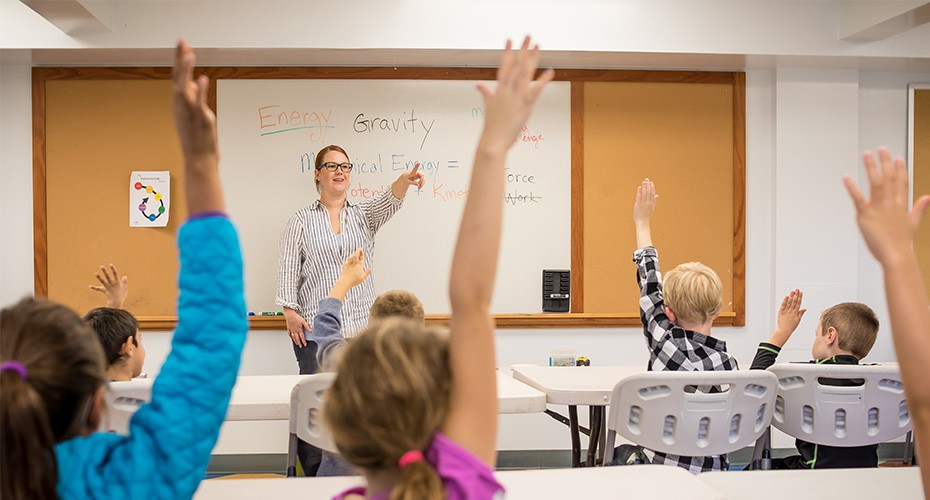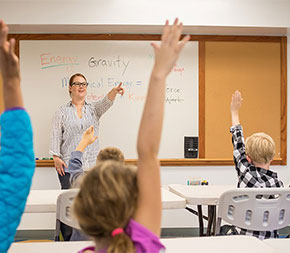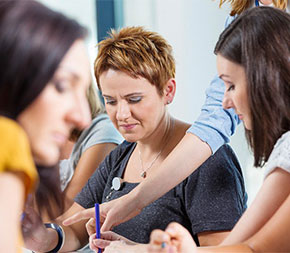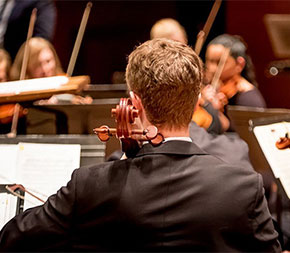Are You Up for the Challenge of a Gifted Education Teacher Career?


All students have gifts, but some students are especially advanced in one or more areas such as math, language, music or art. According to the National Association for Gifted Children, approximately 3 million students are identified as gifted across the country, and more than 8,000 gifted education teachers work with them.
When you choose to become a teacher of the gifted and talented, you perform an essential task: the education of many of tomorrow’s leaders, inventors and teachers.
What Does a Gifted Education Teacher Do?
As a gifted education teacher, you’ll have responsibilities much like other elementary and secondary teachers; however, your duties will include a number of specialized tasks, such as the following:

- Planning challenging lessons and assignments so bright students can work at their ability level
- Developing and learning innovative methods for teaching gifted and talented students
- Gathering materials and resources, and inviting special guests to encourage class time achievement
- Educating students and parents about the opportunities and difficulties associated with exceptional talents
- Encouraging students to develop discipline, accountability, productivity, creativity and leadership skills
- Assisting in the college and career selection process (for secondary gifted education teachers)
Work Environment

Gifted and talented students can be found in schools everywhere, and school districts address their needs with special pull-out gifted education programs, as well as with separate schools that cater to self-paced, independent, experiential and advanced classes. Often, families choose to send their gifted and talented students to special private schools that require comprehensive testing and observation to attend.
Community colleges and universities often offer advanced placement programs to students entering regular college courses. Professors who teach in these programs have taken special coursework that equips them to handle these students in a college setting.
Curriculum and Teaching Standards
In some ways, the needs of gifted students are no different than their peers. They will require clear and careful instruction and evaluation just like any other student. But in many other ways, the needs of gifted learners are completely unique. It is essential that gifted education teachers understand both how their students are different and how they are the same. Below are some common practices these teachers use to help gifted students excel without making them feel like they stand out:

Dedicated Classrooms – Sometimes gifted learners are blended into the rest of the student population, but research has shown that these students perform better when given their own classroom and curriculum. Classrooms may be positioned as two classes, or as a unique entity all their own.

Acceleration – This is simply the process of teaching gifted students at a higher level than their age or grade would typically prescribe. Figuring out how much to accelerate learning so that students are challenged but not confused is an ongoing challenge for gifted education teachers.

Curriculum Compacting – It is important for teachers to reduce the time spent on certain subjects and eliminate redundancy without ignoring these subjects completely. This process is similar to acceleration because teachers find ways to teach more in less time without sacrificing the level of learning.

Grouping – Gifted students come in many forms in terms of both their particular gifts and their individual personalities. Grouping similar students together allows teachers to focus and accelerate their curriculum in a way that would be difficult with a more diverse classroom.

Identification – This is the process of identifying students with gifts, where and how they excel, and identifying the learning strategies those students will most benefit from.

Specialized Programs – In addition to separate classrooms and learning opportunities, many gifted students benefit from specialized learning opportunities. These could include field trips, hands-on experiences or topical classroom guests. The gifted education teacher will need to think outside the classroom as much as possible.
Best Practices for Teaching Gifted Learners
Gifted learners have special skills, but many have special needs as well. In fact, the very things that allow these students to excel intellectually and creatively often cause them to struggle emotionally and socially. Sometimes when a designation of excellence is assigned to a child early in life, it creates a level or pressure that other kids don’t face.
In order to meet the complete needs of these students, not just the educational needs, teachers need to be vigilant and empathetic. They also need to structure their classrooms, their attitude, and their lesson plans in ways that respect the complicated needs of gifted learners. Specific strategies will vary widely by classroom, but here are some best practices that gifted education teachers generally agree on.
- Design a curriculum
- that specifically address the cognitive, physical, emotional and social needs of gifted students.
- Create assignments and activities
- for gifted learners with different levels of ability rather than a one-size-fits-all approach.
- Be flexible
- and try to turn unexpected circumstances into learning opportunities.
- Permit individual projects
- that encourage students based on their own interests.
- Stress learning skills
- that allow students to work ahead at their own pace, and use research and questioning rather than rote memorization and regurgitation.
- Make curriculum interactive
- either between the students and the teacher, or between the students themselves.
- Explore the real world and contemporary issues
- that help students state their opinions and encourage healthy debate.
- Invite other educators
- into the classroom to expand learning opportunities for students.
- Encourage interaction
- with gifted students from other grade levels, classes and schools.
- Promote extracurricular activities
- especially those with an intellectual focus.
- Allow student to set goals
- that promote individuality and ambition.
- Incorporate insights and advice
- that’s offered by the parents of gifted students.
- Don’t apply too much pressure
- on gifted students, or set expectations too high.
- Acknowledge differences
- and realize that students who are gifted in one area may struggle in another.
- Offer opportunities
- for gifted kids and let them socialize with each other and with other students in the school.
- Provide resources
- such as counseling if it’s needed, and supplementary learning tools.
- Honor the differences
- of all the students and look for what makes each child unique beyond his or her intellectual abilities.
Education and Training

Your starting point, if you want to become a gifted students’ teacher, is to complete a bachelor’s degree, either in a particular subject matter or in elementary or secondary education.
By pursing a degree in something besides teaching, you bring a level of expertise into the classroom that gifted students may benefit from. Focusing on education as an undergraduate gets you thinking about teaching early.
After earning a bachelor’s degree, you may go straight into a teacher certification program in your state or choose to complete a 1- or 2-year master’s degree program in gifted education. These programs offer coursework that helps you identify, evaluate and accommodate special abilities, and require a research project and internship. All programs share certain general characteristics, but some will focus on certain student populations or on students with a particular type of gift. Look for a program that is located where you want to be, priced at a level you can afford, and aligned with your particular teaching career goals.
Teacher Certification Requirements

Each state governs its own requirements for gifted endorsement certification programs. Most states require a graduate degree and special certification in order to work in a gifted program. Some states, however, require only a generic teaching degree and certification along with the desire to become a gifted education teacher. Other states require that all regular classroom teachers receive gifted education training.
In order to earn certification, prospective teachers are required to pass a comprehensive exam covering the history, theory, and methodologies of teaching as well as general education knowledge. Most gifted education teachers will also need to pass a supplemental exam focused on the needs of gifted learners. Check with your state Department of Education for information on requirements in your area.
Gifted Learner Traits
The following chart, adapted from Challenge, Modern Curriculum Press, further explores the difference between a “bright child” and a gifted learner:
| A BRIGHT CHILD… | A GIFTED LEARNER… |
|---|---|
| knows the answer | asks the questions |
| is interested | is highly curious |
| is attentive | is mentally and physically involved |
| has good ideas | has wild, silly ideas |
| works hard | plays around, yet tests well |
| answers the questions | discusses in detail; elaborates |
| is in the top group | is beyond the top group |
| listens with interest | shows strong feelings and opinions |
| learns with ease | already knows |
| needs only 6–8 repetitions for mastery | needs only 1–2 repetitions for mastery |
| understands ideas | constructs abstractions |
| enjoys peers | prefers adults |
| grasps meanings | draws inferences |
| completes assignments | initiates projects |
| is receptive | is intense |
| copies accurately | creates new designs |
| enjoys school | enjoys learning |
| absorbs information | manipulates information |
| is a technician | is an inventor |
| is a good memorizer | is a good guesser |
| enjoys a straightforward, sequential presentation | thrives on complexity |
| is alert | is keenly observant |
| is pleased with his or her own learning | is highly self-critical |



